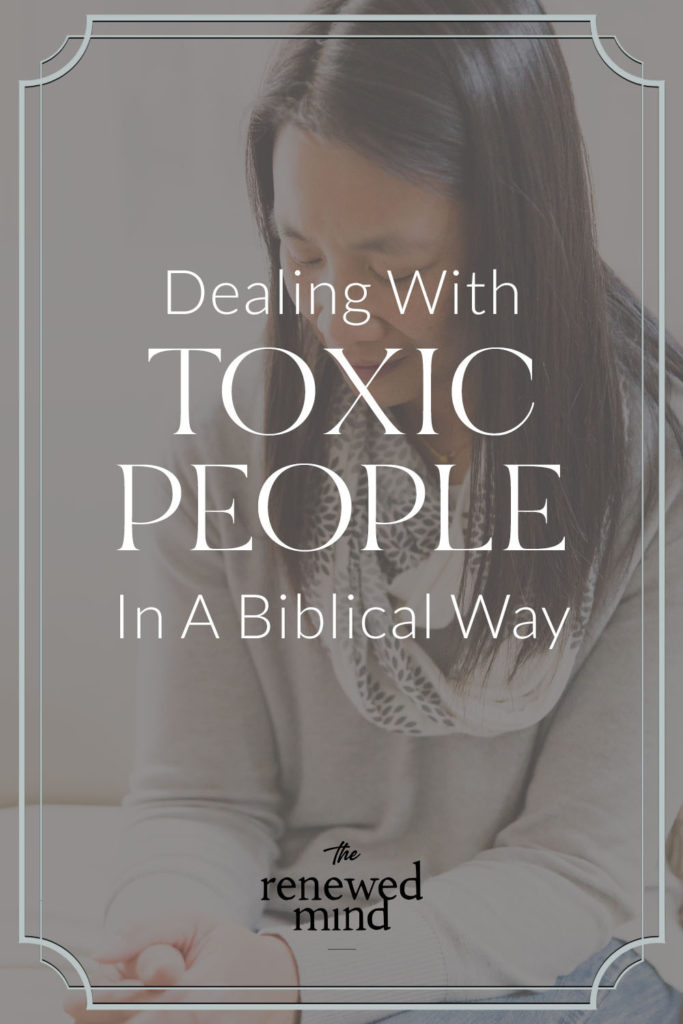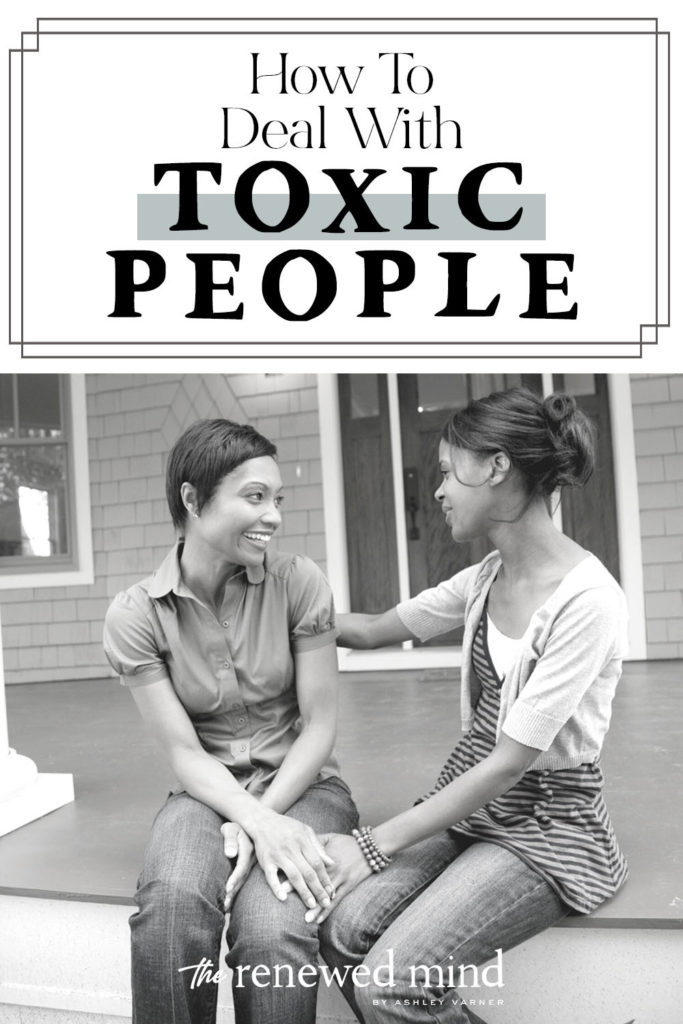We all have people in our lives who are difficult to be around. There may even be people in your life who are toxic. These people may try to manipulate, intimidate, or control you.
Today, I’m sharing how you can proactively deal with toxic people in your life by changing your mindset, pausing before reacting, and creating healthy boundaries.
Resources Mentioned:
Renew180 (formally 180Confidence)
Dealing wth Toxic People
I don’t like to label people as “toxic,” but we all know people who use negativity, manipulation, and intimidation to control those around them. Maybe they have used it to control you.
“Toxic” people can also apply to people who complain all the time or try to bring you down emotionally.
When we say “toxic people,” we usually mean people who take a lot of thought-work to be around. For example, it could be someone who responds with discouragement when you share your dreams with them which requires extra work from you to avoid letting your thoughts take a negative turn.
These days, typical advice for dealing with toxic people is to cut them out of your life, but that simply isn’t always possible. The toxic person might be a close family member or a coworker, and spending time with them might not be in your control.
I do recommend limiting your time with toxic people, but removing them from your life will not always be possible. Let’s look at three things we can do to work on our own thoughts and deal with toxic people.
Work on Yourself First
The first thing we have to do is work on ourselves, and that starts with identifying and dealing with our own triggers.
Sometimes the reason someone sets us off is not just because their behavior is annoying or toxic, but because we see some part of ourselves (a part we don’t like) reflected in the other person.
When we know what our triggers are, we can work on them, and they will become less triggering when we encounter them in someone else.
Example: Someone in your life interrupts you all the time, and that behavior makes you feel unheard and frustrated. If you take some time to reflect, you might find that you also interrupt others. If you spend time working on yourself and learning not to interrupt, it won’t be as big of a trigger for you when you see that behavior in someone else.
Another thing you need to do is learn to say no. “No” can be a powerful tool in setting boundaries against toxic people and situations.
When we create boundaries, we are saying, “This is a rule that I set up for myself, not necessarily for the other person.” Sometimes we think of boundaries as a way to control other people, but in reality, we are telling others about the expectations we have set up for ourselves.
How they react to those boundaries is up to them.

Example: You might have a boundary for yourself that says you will only volunteer for two things a year. This boundary is meant to keep you from overextending yourself by volunteering for five different roles. That’s a boundary that you set up for yourself. You are committing to yourself to say “no” after volunteering for two roles.
Let the boundary be the bad guy. Using the example above, if someone comes to you with another volunteer opportunity, say, “I’m sorry, but I’ve set a boundary for myself to only volunteer for two things this year.” This shows that you aren’t saying “no” because you don’t want to do something but because you are respecting your own boundaries.
Toxic people can be the ones who take advantage of the fact that we want to say “yes” and be helpful. Know that whenever you say “yes” to one thing, you are saying “no” to something else.
Saying “no” can be hard, especially for women who are “doers” (successful in careers, great at tackling projects, go-getters) and for people-pleasers. If either of those categories applies to you, learning to say “no” will be essential for helping you set boundaries.
You might think that working on yourself isn’t going to really help with toxic people, but the boundaries that you set will have a ripple effect. Going back to the example of volunteer boundaries, once you have told the volunteer coordinator that you have a boundary and won’t be volunteering, he/she isn’t likely to come asking another three or four times.
However, if they do continue to pester you and try to make you break your boundary, recognize that as the red flag of a person with whom you should limit your interactions.
Lastly, when it comes to working on yourself, know that you can postpone decisions and commitments.
Example: If there is a needy person in your life who calls you to complain about everything for hours on a regular basis, schedule a later time to meet up with them and discuss their complaints.
A difficult person wants instantaneous access to you so they can have the gratification of complaining right now. They might schedule a time (a sign that they may genuinely need to talk), but oftentimes, they will decline and choose to call someone who will listen to their complaining right now.
Pause Before Reacting
I know we all want to jump to working on the other person, but we need some helpful tools to help us react in the best way possible. Learning to pause before reacting will make a huge difference.
Moderating your response to toxic people is a way to take back your power and put space between their actions and your mental health.
Pausing before reacting is important because our reactions can become habitual. If someone tends to set us off on a regular basis then we may fall into a pattern of overreacting even if the situation doesn’t warrant it.
We learn to expect confrontation, so we react defensively to everything. Sometimes this is because we are feeding off other people’s drama even though it is ultimately toxic and harmful to us.
We need to take a step back and analyze our own reactions. I want you to ask yourself these questions before you react:
- Two weeks from now, will this situation feel as important as it does now?
- Is my emotional response stronger than it should be?
- Am I giving this person too much power over my emotions?
- Will my response contribute to a toxic situation instead of diffusing it?
- Would I be better served by not emotionally responding to this?
- Can I let this go and walk away?
A lot of these questions have to do with examining your own thoughts about the person and the situation. Remember how I said that I don’t like to label people as “toxic?” That’s because sometimes it is our own perception of the person that is toxic rather than the person herself/himself.
But when someone is genuinely being toxic, I try to tell myself, “That’s just how they are.” Instead of assuming that their behavior has something to do with me and that I need to react, I acknowledge that their behavior is a reflection of them and does not require my response.
Of course, you can have emotions about the situation, but if you take your thoughts captive, you don’t have to respond emotionally.
Sometimes, our reactions can be just as toxic as the behavior of the other person.
Learning to control our emotions and reactions requires work, and that is why I am offering Renew180 (formerly 180Confidence). It takes time and effort to learn how to respond to others, balance our thoughts, and control our emotions, and sometimes we need help.
SPECIAL NOTE: Renew180 (formerly 180Confidence) is now open! This is a Christian, Bible-based coaching for professional Christian women who want to work on areas of their lives where they need confidence. It all starts with your mindset, so I’m going to teach you how your outer world affects your inner confidence and vice-versa. We’ll talk about body confidence, relationships, and more. Check it out today!
Creating Effective Boundaries
A boundary is a plan for what YOU will do, it is not requiring someone else to act in a certain way. Some of us tend to want to fix things for people we care about, but this only gets us emotionally tied into their problems while draining us.
People rarely change because someone else wants them to, and they don’t grow if they aren’t forced to fix their own problems.

Putting your energy into fixing other people only leaves you tired and unfulfilled. The best thing we can do is put our energy into aligning our thoughts with God’s thoughts and choose to control our own emotions and responses.
Remember, the boundary isn’t put in place to manipulate someone else. The boundary is for you.
Boundaries don’t say, “Do this or else!” The best boundaries are made out of love. They say, “I love you so much, and that is why I am choosing to do this.” It could be out of love for the other person, or it could be out of love for yourself or your family.
Example: Let’s say that you have a family friend who is always negative about your family and openly talks about how much she dislikes kids (right in front of your kids!). What you can say is, “I am happy to meet with you one-on-one, but my boundary is that you will not be around my kids since you say negative things about them and our family. If you continue to act this way, the kids just can’t be around you.”
You’re not telling the person that they have to change. They won’t change just because you want them to anyway. You’re simply making the choice for your family that your kids will not be around someone who says hurtful things about them.
A boundary can’t tell someone else not to do something, but it is a plan for what you will do if someone does something outside of what you think is acceptable.
Why Boundaries Are Important
Boundaries tell people how to treat you and your family.
If there are people who are demanding the time, energy, and attention that you think should go to your kids and spouse, then you can put boundaries in place to limit the amount of access those people have to you in order to protect your family and yourself.
If there is one thing I want you to take away from this, it is that boundaries should be built with love. They do not have to be put in place because you are unhappy with someone. They can be put in place because you love yourself, your family, and other people.
You can build the friendships and relationships that you want by establishing the boundaries ahead of time.
As you build boundaries, there might be some friendships that you restore and grow. There might be others that you allow to dissipate because you know that the other person won’t respect your boundaries.
It’s okay to let go of friendships with people who refuse to respect your boundaries.
This doesn’t mean that you aren’t kind to them or that you don’t want to be at peace with them, but it does mean that you can limit your time with them.
When dealing with toxic people, the best thing that you can do is pray about it first and listen to what God tells you to do.
It might mean not spending time with them. I truly believe that God ends seasons of friendship on purpose. It might also mean that He uses it to grow you before being able to establish boundaries and proceed with the friendship.
I hope this helped you today. If it did, make sure to share this post or save it for later.
Share Now or Pin for Later

